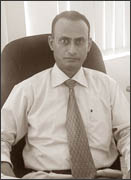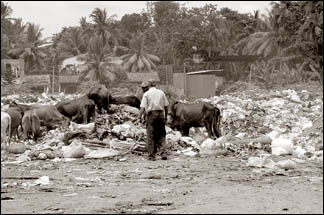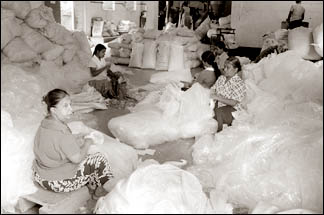A dire need to recycle plastic waste
Central Environmental Authority initiates project:
by Sajitha Prematunge
|

M. Rizvi Majeed
Pic : Thushara Wellage
|
Plastic is a can't-do-without necessity of the 21st century. It's
easy to handle, durable, flexible and cheap. But getting rid of it, when
the need arises, is no easy task. Burning would cause emitting of
dangerous toxic fumes, burying would cause soil and water pollution, and
only make matters worse if carelessly thrown away, by clogging the sewer
systems and serving as breeding grounds for decease causing parasites.
The Central Environmental Authority has identified the need to
recycle plastic. The bann on less than 20 micron plastics was
administered with the hope that consumers would reuse them. But recent
studies show that this is not the case.
The project director of the National Post Consumer Plastic Waste
Management Project, administered by the plastic partnership committee in
collaboration with the Central Environmental Authority, Mr. Rizvi Majeed
stated that the main objectives of the project is the collection of the
plastic waste, recycling and education of the public.
Mr. Majeed also stated that the project office is only a facilitator
and that the support of the local authorities like local Municipal
Councils is of utmost importance.
Sorted waste is to be collected from the house holds by the Municipal
Councils and plastic waste is sent to ware houses within the
jurisdictions. This is where the recycling process takes place.
Individuals can also drop off their plastic waste in the ware houses.

Garbage dump in Nawinna Pix: Chinthaka Kumarasinghe |

Workers at a plastic recycling factory in Polgasowita |
By this process of waste directly getting transferred to a central
ware house such environmental issues as ground, water and even air
pollution, caused by burning of plastic, can be easily prevented.
Further more plastic obtained by the recycling process can be used as
raw material for other production purposes, explained Mr. Majeed.
The project office of the National Post Consumer Plastic Waste
Management Project (NPCPWMP) has their eyes on existing recycling
companies and are willing to assist them with technical know how and
machinery.
They are also looking to set up new factories. The third objective,
education of the public, is achieved through workshops, awareness
programmes and promotional campaigns. Mr. Majeed also claimed that
preparations for school level art exhibitions, debates and competitions
are under way. They also hope to educate the public through media.
The official launch of the project was one such awareness programme
in itself, held at the Sri Rahula Girls School Malabe, with the honoured
presence of Ven. Mahasangha, Minister of Environment and Natural
Resources Patali Champika Ranawaka, Minister of Education Susil
Premajayantha, Director General Central Environmental Authority Mr.
Udaya Gammanpilla, Member Pradeshiya Sabha Mr. Sarath Sumanasekera and
many other distinguished guests.
The dangers of unplanned garbage disposal, the importance of
educating the young generation about recycling and its benefits were the
main focus of the programme. Minister Champika Ranawaka talked about the
plight of garbage disposal such as in Maharagama, Aththidiya, etc... He
also stressed the fact that no amount of laws and legislations would be
of use if proper disposal methods are not adhered to.
The Chairman of the CEA reiterated the fact by saying that recycling
is better than any tax or legislation. He also stated that within 25
years we have got used to plastic for the sake of ease, but tend to
overlook the extent of pollution caused by it. Minister Susil
Premajayantha emphasized the importance of educating the public
specially the school children on proper garbage disposal, management and
recycling.
The local authorities will collect the segregated waste at house hold
level and from public places, to ware houses. The project office has
already planned to have tractors to be separated in to 3 compartments -
glass, plastic and paper.
Mr. Majeed said that they are going out of their way to collect all
the waste to get at their real motive - obtaining plastic for recycling.
This is a win situation where the public gets rid of their garbage, the
recycles get their raw material and the impact to the natural
environment is brought down to a minimum.
Through recycling 10% of the current demand for plastic can be
provided, and used in another industry. This will also reduce the amount
of annual plastic imports plus most of the machinery for recycling is
made locally, which will save a lot of foreign exchange.
This will be an economically very viable industry. The newly
established and improved recycling factories and ware houses will also
provide thousands of new jobs. It is by no means a must for the public
to provide clean plastic material as was previously believed, since the
recycles or the warehouses would handle that, with the help of labourers;
resulting in the creation of more and more jobs in the industry.
The recycled plastic can be used in packaging (non food) and toy
manufacturing industries.
Mr. Chandraratne an owner of a plastic recycling factory stated that
out of 800 - 1000 kgs of plastic waste they receive daily only 2% is
wasted during the recycling process. The plastic is obtained from waste
collectors and factories and prizes depend on the quality of the waste.
Some industries provide plastic waste to the recycling companies and
reintegrate the recycled plastic in their production process.
The plastic so acquired is first rid of its various labels and
stickers and washed, cut and heated and made in to a cord all by using a
series of machines. Then the cord is cut in to small pieces and mixed
with HD plastic - an imported non pre-used kind, then colour is added,
and additive is added to make bio degradable garbage bags. The buyers
range from Municipal Councils to private shop owners. Recycled raw
material can also be used in toy, film and injection moulding
productions.
However Mr. Majeed stated that some recycling factories use primitive
technology and does not pay much attention to health and safety
precautions. One of the main objectives of the National Post Consumer
Plastic Waste Management Project is to educate and provide technical
assistance to the recycles as well.
Initially launched in Colombo and Gampaha Districts, emanating
through out their 31 local authorities, Mr. Majeed stated that the
project will be implemented in Kurunegala, Kandy and Galle Districts
with in the next year.
The project office will provide the local authorities and the public
with necessary technical guidance for setting up of collection centres,
collection process, segregation of garbage and recycling. Making use of
existing foreign expertise the project will focus on introducing cost
effective methods of recycling, to the factories.
Segregation of waste is crucial in this process and the educational
programme will mainly focus on instilling this habit in the public. The
project has already set up a 24 hour hotline 0773909090 for any
inquiries.
[email protected]
|
